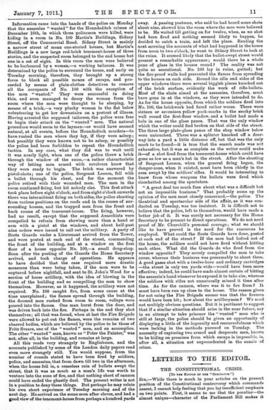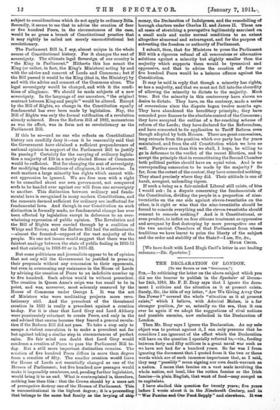LETTERS TO THE EDITOR.
THE CONSTITUTIONAL CRISIS.
[TO THR EDITOR OP TER " SPIICTATOR.."1
SIR,—While there is much in your articles on the present position of the Constitutional controversy which commands assent, I cannot help feeling that you lay insufficient emphasis on two points. First, it seems to me that the peculiar—the almost unique—character of the Parliament Bill makes it subject to considerations which do not apply to ordinary Bills. Secondly, it seems to me that to advise the creation of four or five hundred Peers, in the circumstances of the ease, would be so gross a breach of Constitutional practice that it may rightly be called not merely unconstitutional but revolutionary.
The Parliament Bill is, I say, almost unique in the whole course of Constitutional history. For it changes the seat of sovereignty. The ultimate legal Sovereign of our country is " the King in Parliament." Hitherto this has meant the King (or rather, in fact, the King's Ministers) acting by and with the advice and consent of Lords and Commons ; but if the Bill passed it would be the King (that is, the Ministry) by and with the advice and consent of the Commons alone. The legal sovereignty would be changed, and with it the condi- tions of allegiance. We should be made subjects of a new sovereignty. In the language of our ancestors, "the original contract between King and people" would be altered. Except by the Bill of Rights, no change in the Constitution equally fundamental has ever been made by legislation. Nay, the Bill of Rights was only the formal ratification of a revolution already achieved. Even the Reform Bill of 1832, momentous as was its effect, was in form not so revolutionary as the Parliament Bill.
If this be so—and no one who reflects on Constitutional history can candidly deny it—can it be reasonably said that the Government have obtained a sufficient preponderance of national opinion in support of the Parliament Bill to justify its passing ? Certainly for the carrying of ordinary legisla- tion a majority of 120 in a newly elected House of Commons would be sufficient. But for changing the seat of sovereignty, for modifying the conditions of allegiance, it is otherwise. In such matters a large minority has rights which cannot with- out oppression be ignored. We are free men with a right to be consulted about our own government, not conquered serfs to be handed over against our will from one sovereignty to another. This distinction between ordinary and funda- mental laws is recognised in many modern Constitutions, and the consents deemed sufficient for ordinary are ineffectual for fundamental laws. And though in our Constitution no such distinction is formally made, no fundamental change has ever been effected by legislation except in deference to an over- whelming expression of public opinion. The Revolution and the Bill of Rights were carried through by a coalition of Whigs and Tories; and the Reform Bill had the enthusiastic —almost the frenzied—support of the vast majority of the people. No one not insane would suggest that there was the faintest analogy between the state of public feeling in 1910-11 and that existing in 1688-89 or in 1831-32.
But some politicians and journalists appear to be of opinion that not only will the Government be justified in pressng their proposals without any concession to their opponents, but even in overcoming any resistance in the House of Lords by advising the creation of Peers to an indefinite number up to five hundred. Such advice would be without precedent. The creation in Queen Anne's reign was too small to be in point, and was, moreover, most solemnly censured by the House of Commons under George L It was the act of Ministers who were meditating projects more revo- lutionary still. And the precedent of the threatened creation in 1832 is really a precedent against a creation to-day. For it is clear that Lord Grey and Lord Althorp were passionately reluctant to create Peers, and only in the end advised that course because they feared a general revolu- tion if the Reform Bill did not pass. To take a step only to escape a violent convulsion is to make a precedent not for but against taking a similar step in circumstances of perfect calm. No fair mind can doubt that Lord Grey would condemn a creation of Peers to pass the Parliament Bill to- day. But a still more important distinction remains. The creation of five hundred Peers differs in more than degree from a creation of fifty. The smaller creation would leave the House of Lords not essentially changed as one of the Houses of Parliament; bat five hundred new peerages would make it impossibly cumbrous, and, pending further legislation, would bring it to an end. What is contemplated is, therefore, nothing less than this : that the Crown should by a mere act of prerogative destroy one of the Houses of Parliament. This is unconstitutional in the highest degree ; it is a proceeding that belongs to the same bad family as the levying of ship money, the Declaration of Indulgence, and the remodelling of borough charters under Charles II. and James IL These are all cases of stretching a prerogative legitimately exercised on a small scale and under normal conditions to an extent altogether abnormal and extravagant, and for the purpose of subverting the freedom or authority of Parliament.
I submit, then, that for Ministers to press the Parliament Bill with a rigorous refusal of all concessions or alternative solutions against a minority but slightly smaller than the majority which supports them would be tyrannical and oppressive, and that to advise the creation of four or five hundred Peers would be a heinous offence against the Constitution.
It may be said in reply that though a minority has rights, so has a majority, and that we must not fall into the absurdity of allowing the minority to dictate to the majority. Most true. But the minority in this controversy have shown no desire to dictate. They have, on the contrary, made a series of concessions since the dispute began twelve months ago. They have abandoned the hereditary principle ; they have conceded pure finance to the absolute control of the Commons ; they have accepted the outline of a far-reaching scheme of reform of the Lords; they have declared for the Referendum, and have consented to its application to Tariff Reform even though adopted by both Houses. These are great concessions,. long retreats from the position which our party has for years maintained, and from the old Constitution which we love so well. Further even than this we shall, I hope, be willing to. go in deference to the verdict of the recent Election, and to accept the principle that in reconstituting the Second Chamber both political parties should have an equal voice. And is no corresponding concession to be made by the majority ? So far, from the outset of the contest, they have conceded nothing. They stand precisely where they did. Their attitude is one of harsh, arrogant, unbending rigour.
If such a being as a fair-minded Liberal still exists, of him, I would ask : In a dispute concerning the fundamentals of the Constitution, dividing the people in a proportion of nine- twentieths on the one side against eleven-twentieths on the other, is it right or wise that the nine-twentieths should be forced to concede everything and the eleven-twentieths should consent to concede nothing ? And is it Constitutional, or even prudent, to inflict on free citizens treatment so oppressive and arrogant by first destroying by mere prerogative one of the two ancient Chambers of that Parliament from whose- traditions we have learnt to prize the liberty of the subject and the order and stability of the State F—I am, Sir, &c.,
HUGH CECIL. [We have dealt with Lord Hugh Cecil's letter in our leading columns.—En. Spectator.]



















































 Previous page
Previous page